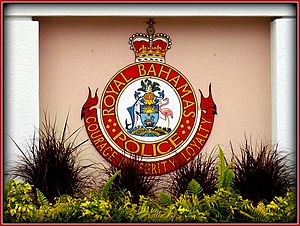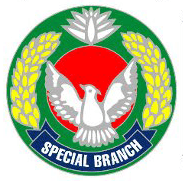Special Branch facts for kids
The Special Branch is a name often used for police units that protect a country's safety and gather important information. These units work to keep the country safe from threats like terrorism and other extreme activities. They collect information, called intelligence, to understand and stop these dangers.
The very first Special Branch started in London, England, in March 1883. It was first called the Special Irish Branch and was created to deal with a group called the Irish Republican Brotherhood. Over time, its job grew to include more than just Irish-related issues, and it became known simply as the Special Branch.
Contents
Special Branch Around the World
Many countries, especially those connected to the Commonwealth of Nations, have or had their own Special Branch units.
Australia
Most police forces in Australia, including the federal police, had a Special Branch. Their main job was to watch groups like the Communist Party of Australia and other political groups that were seen as extreme or dangerous. During World War II, they also focused on German and Japanese activities.
- The first Commonwealth Police Force was created in 1917. It was a type of federal Special Branch but was closed down in 1919.
- A new Commonwealth Police Special Branch was set up in 1957. It later joined the Australian Federal Police in 1979.
- The Australian Federal Police Special Branch changed its name in 1985 and then merged into another department in 1995.
- The New South Wales Police Force had a "Subversive Organisations Branch" from 1933. This unit later became the Special Branch in 1948. An investigation in 1997 found that this Special Branch was collecting information on people who were not a threat. Because of this, it was closed down.
- The Queensland Police Special Bureau started in 1940 and became the Special Branch in 1948. It was criticized for being used for political reasons in the 1970s and 1980s. For example, it sometimes used people to cause trouble at protests so that protesters could be arrested. It was closed in 1989 after a major investigation into police actions.
- South Australia Police had an Intelligence Branch during World War II. Later, a "Subversive Section" was formed in 1947, becoming the Special Branch in 1949. This branch collected information on many people, including politicians and church leaders. In 1977, an inquiry found that many of these files were "scandalously inaccurate" and unfair. The Special Branch was closed in 1984.
- The Victoria Police Special Branch was active from 1931 to 1983. Today, similar work is done by the Security Intelligence Group.
Bahamas
In the Commonwealth of the Bahamas, the Security and Intelligence Branch is also known as Special Branch. It is the main group that gathers information and protects the country's safety. Its job is to ensure the safety of everyone in the Bahamas. This branch also checks the backgrounds of people applying for jobs like police officers.
Bangladesh
The Bangladeshi Special Branch is the main intelligence agency in Bangladesh. It has many sections and offices across the country. All its members are part of the Bangladesh Police. The head of the Special Branch reports directly to the Prime Minister of Bangladesh. This agency works at all levels to protect the country, both inside and outside its borders.
Belize
The Special Branch in Belize is responsible for the country's internal safety and for collecting information for security services.
Canada
From 1950 to 1984, the RCMP Security Service acted as Canada's "Special Branch." It was later replaced by the Canadian Security Intelligence Service.
Fiji
The Special Branch unit of the Fiji Police Force is known as one of the best intelligence units in the Asia Pacific region. Like other Special Branches, it deals with national security issues. It helps with international police cooperation (Interpol), stopping terrorism, watching suspicious activities, and protecting important people. People usually join Special Branch by being recruited, sometimes from the Republic of Fiji Military Forces.
In 2009, the unit's name was changed to the Fiji Police Intelligence Bureau as part of efforts to modernize the police force.
Hong Kong
In Hong Kong, an "Anti-Communist Squad" was formed in the police force by 1930. It was called the "Political Department" in Chinese. In 1933, its English name became "Special Branch." Besides stopping dangerous activities, it also handled immigration and passports in its early years.
By 1949, the Special Branch was a top division of the police. It was known for being very professional, also working on stopping corruption and organized crime groups called Triads. By 1977, it had almost a thousand members.
The Special Branch was closed down in 1995, before Hong Kong was returned to China in 1997. Some of its units were moved to other police departments. Information gathered by the Special Branch was deleted to prevent it from being transferred to Chinese hands, though some files went to London.
India
In India, the Special Branch is a separate part of the state police forces. They handle state security matters. However, more serious cases of spying are handled by the Intelligence Bureau, which is India's federal internal security agency.
Ireland
In Ireland, the 'Special Branch' is officially called the Special Detective Unit (SDU). This unit works to stop terrorism and gather information to protect the state. It investigates threats to national security and watches people and groups that could be dangerous. The SDU works closely with other special police units and Ireland's military intelligence agency. It also shares information with similar units in other countries, like the United Kingdom, to fight terrorism.
Malaysia
The Malaysian Special Branch is an intelligence agency connected to the Royal Malaysian Police. Its job is to gather information on threats to the country, including dangerous activities, extreme groups, and spying. It also advises other police departments and agencies on what actions to take.
Myanmar
The Special Branch in Myanmar is part of the Myanmar Police Force and is also known as the Special Intelligence Department.
New Zealand
The New Zealand Police Special Branch was officially created in 1949. Its job was to deal with dangerous organizations and check the backgrounds of public servants. It watched groups like the Communist Party of New Zealand and certain trade unions. In 1956, its duties were moved to the New Zealand Security Intelligence Service, which still exists today.
Papua New Guinea
Special Branch sections were set up in the police forces of Papua and New Guinea in 1947. These units later merged into the Royal Papua New Guinea Constabulary in 1950.
Rhodesia
The British South Africa Police (BSAP) developed its Special Branch in the early 1950s as political unrest grew. It continued to be active and helped create a special military unit during the Rhodesian Bush War. After Zimbabwe became independent in 1980, parts of the Special Branch were replaced by new intelligence divisions.
Singapore
The Security and Intelligence Division is Singapore's external intelligence agency. It gathers and analyzes information related to the country's safety from outside threats. It is part of the Ministry of Defence but operates with some independence.
South Africa
During Apartheid, the South African Police's Security Branch, also known as the Special Branch, was a police unit that watched groups that opposed Apartheid. They collected information, watched meetings, and recruited people to provide information. They were linked to actions against anti-Apartheid activists. Today, it is the Crime Intelligence Unit, which investigates crimes and continues to watch groups seen as threats to the state.
Sri Lanka
The Special Branch of Ceylon (now Sri Lanka) was created in late 1966. It was an intelligence agency connected to the Sri Lanka Police Service and focused on national security. It was closed down in 1970.
United Kingdom
The world's first Special Branch was formed in London in 1883. Over time, each police force in the United Kingdom created its own Special Branch. The largest was that of the Metropolitan Police. In 2006, the Metropolitan Police Special Branch merged with the Anti-Terrorist Branch to form the Counter Terrorism Command (SO15).
Special Branch units were responsible for protecting important people (who were not royalty) and checking people at ports and airports, as allowed by the Terrorism Act 2000.
The intelligence work of Special Branch was very important. Special Branch officers were often the ones who arrested suspected spies, as officers from the Security Service (MI5) are not allowed to make arrests themselves. An example is the Portland Spy Ring.
Most police services in the UK still have a Special Branch or similar units. However, new regional counter-terrorism and organized crime units have also been created between smaller police forces.
 | Victor J. Glover |
 | Yvonne Cagle |
 | Jeanette Epps |
 | Bernard A. Harris Jr. |



